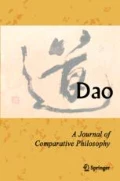Abstract
This essay examines the structural position of Mengzi’s 孟子 heart of compassion (ceyin zhi xin 惻隱之心) within his theoretical goal of teaching moral self-cultivation. I first investigate Kim Myeong-seok’s account that views ceyin zhi xin as a higher cognitive emotion with a concern-based construal. I argue that Kim’s conclusion is not sufficiently supported by the text of the Mengzi, but is also tarnished by the possibility of constructing a noncognitivist counter-theory of ceyin zhi xin. Instead, I suggest that David Hume’s causation-based approach to sentiment provides an alternative route to reach the theoretical core of Mengzi’s ceyin zhi xin. People’s uniform moral sentiment as the effect of mental causation implies that there is a natural cause universally engraved in the human heart. As Mengzi’s practical teaching of moral self-cultivation begins with recognizing this heart of compassion, his focus is placed not upon the characteristics of the expressed emotion, but upon the universal presence of its natural cause in the human heart which demonstrates our moral potential to care for others.
Similar content being viewed by others
References
Baillie, James. 2000. Routledge Philosophy Guidebook to Hume on Morality. New York: Routledge.
Bloom, Irene. 1997. “Human Nature and Biological Nature in Mencius.” Philosophy East and West 47.1: 21–32.
Bloom, Irene, and Philip J. Ivanhoe, trans. 2011. Mencius. New York: Columbia University Press.
Choi, Dobin. 2018. “Moral Artisanship in Mengzi 6A7.” Dao: A Journal of Comparative Philosophy 17.3: 331–348.
______. 2019. “Mengzi’s Maxim for Righteousness in Mengzi 2A2.” Dao: A Journal of Comparative Philosophy 18.3. Forthcoming.
Griffiths, Paul. 1997. What Emotions Really Are: The Problem of Psychological Categories. Chicago: University of Chicago Press.
Hume, David. 1985. “Of the Standard of Taste.” In Essays, Moral, Political, and Literary, edited by Eugene Miller. Indianapolis: Liberty Fund.
______. 1998a. An Enquiry Concerning the Human Understanding: A Critical Edition. Edited by Tom L. Beauchamp. Oxford: Oxford University Press.
______. 1998b. An Enquiry Concerning the Principles of Morals. Edited by Tom L. Beauchamp. Oxford: Oxford University Press.
______. 2000. A Treatise of Human Nature. Edited by David Fate Norton and Mary J. Norton. Oxford: Oxford University Press.
Kauppinen, Antti. 2017. “Moral Sentimentalism.” The Stanford Encyclopedia of Philosophy (Spring 2017 Edition), edited by Edward N. Zalta. https://plato.stanford.edu/archives/spr2017/entries/moral-sentimentalism/ (last accessed on September 7, 2018).
Kim, Myeong-seok. 2010. “What Cèyin Zhi Xin (Compassion/Familial Affection) Really Is.” Dao: A Journal of Comparative Philosophy 9.4: 407–425.
______. 2014. “Is There No Distinction Between Reason and Emotion in Mengzi?” Philosophy East and West 64.1: 49–81.
King, R. A. H. 2011. “Universality and Argument in Mencius IIA6.” Proceedings of the Aristotelian Society 111: 275–293.
Lau, D. C., trans. 1970. Mencius. London: Penguin.
Legge, James, trans. 2011. The Works of Mencius. New York: Dover Publications.
Liu, Xiusheng. 2003. Mencius, Hume, and the Foundations of Ethics. Aldershot, Hampshire; Burlington: Ashgate Pub. Ltd.
Mancilla, Alejandra. 2013. “The Bridge of Benevolence: Hutcheson and Mencius.” Dao: A Journal of Comparative Philosophy 12.1: 57–72.
Prinz, Jesse J. 2004. Gut Reactions: A Perceptual Theory of Emotion. Oxford: Oxford University Press.
Roberts, Robert. 1988. “What an Emotion Is: A Sketch.” The Philosophical Review 97.2: 183–209.
Shun, Kwong-loi. 1997. Mencius and Early Chinese Thought. Stanford: Stanford University Press.
Van Norden, Bryan, trans. 2008. Mengzi: With Selections from Traditional Commentaries. Indianapolis: Hackett.
Wang, Fuzhi 王夫之. 1975. Discourse on Reading the Great Collection of Commentaries on the Four Books 讀四書大全說. Beijing 北京: Zhonghua Shuju中華書局.
Wong, David B. 2002. “Reasons and Analogical Reasoning in Mengzi.” In Essays on the Moral Philosophy of Mengzi, edited by Liu Xiusheng and Philip J. Ivanhoe. Indianapolis: Hackett.
Acknowledgments
This essay’s earlier version was presented at the 5th Northeast Conference on Chinese Thought at the University of Bridgeport, November 2016 and at the ISCWP panel at the Eastern APA meeting in Baltimore, January 2017. I am grateful to the audience of both conferences and the anonymous referees of this journal, whose critical suggestions have much improved this essay. This is a condensed version of the first chapter of my dissertation, written under the supervision of Dr. Yu Jiyuan. It was one of the most pleasing moments in my life when he approved my doctoral project after reviewing this chapter in the summer of 2014.
Author information
Authors and Affiliations
Corresponding author
Rights and permissions
About this article
Cite this article
Choi, D. The Heart of Compassion in Mengzi 2A6. Dao 18, 59–76 (2019). https://doi.org/10.1007/s11712-018-9641-7
Published:
Issue Date:
DOI: https://doi.org/10.1007/s11712-018-9641-7




